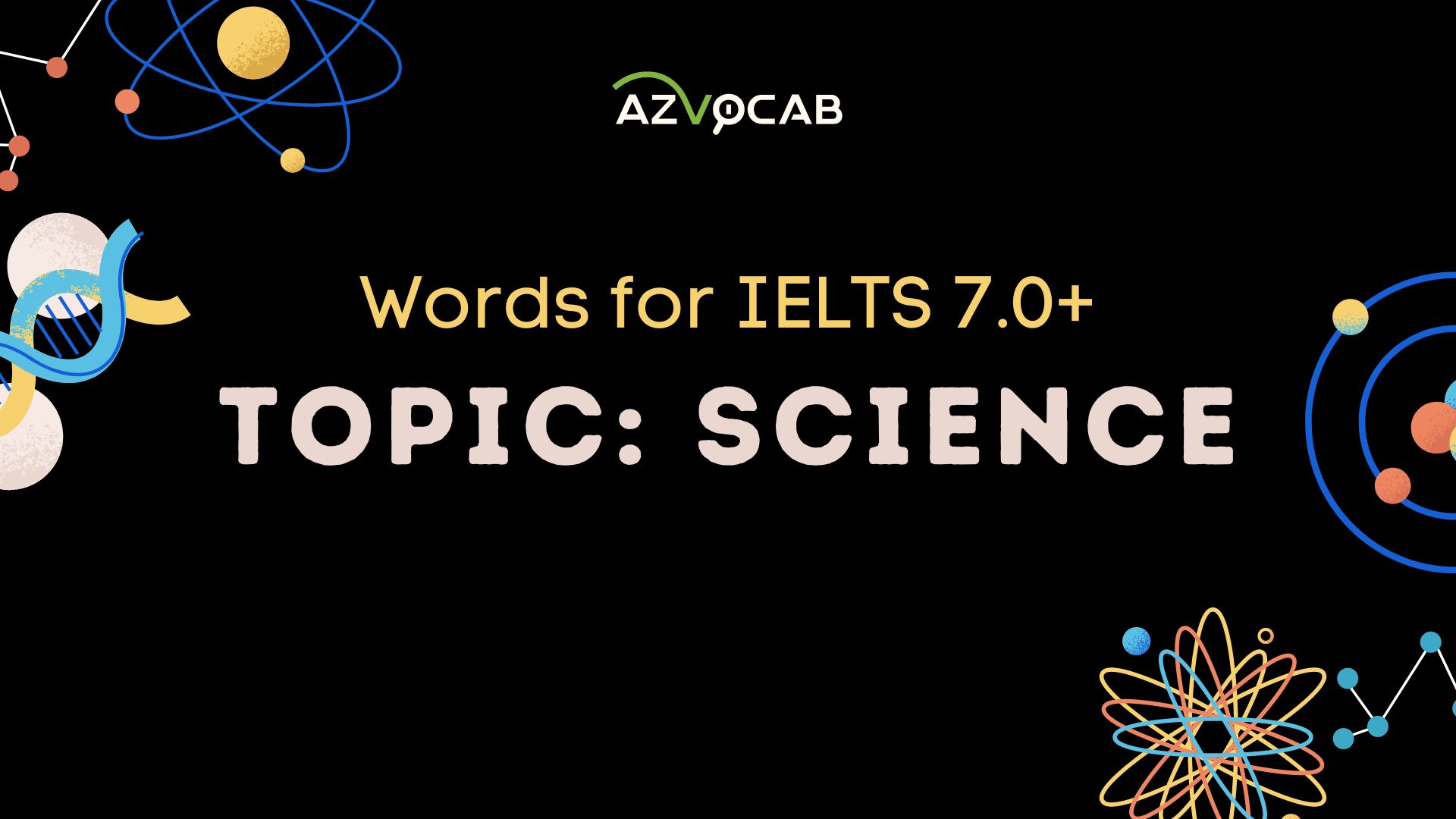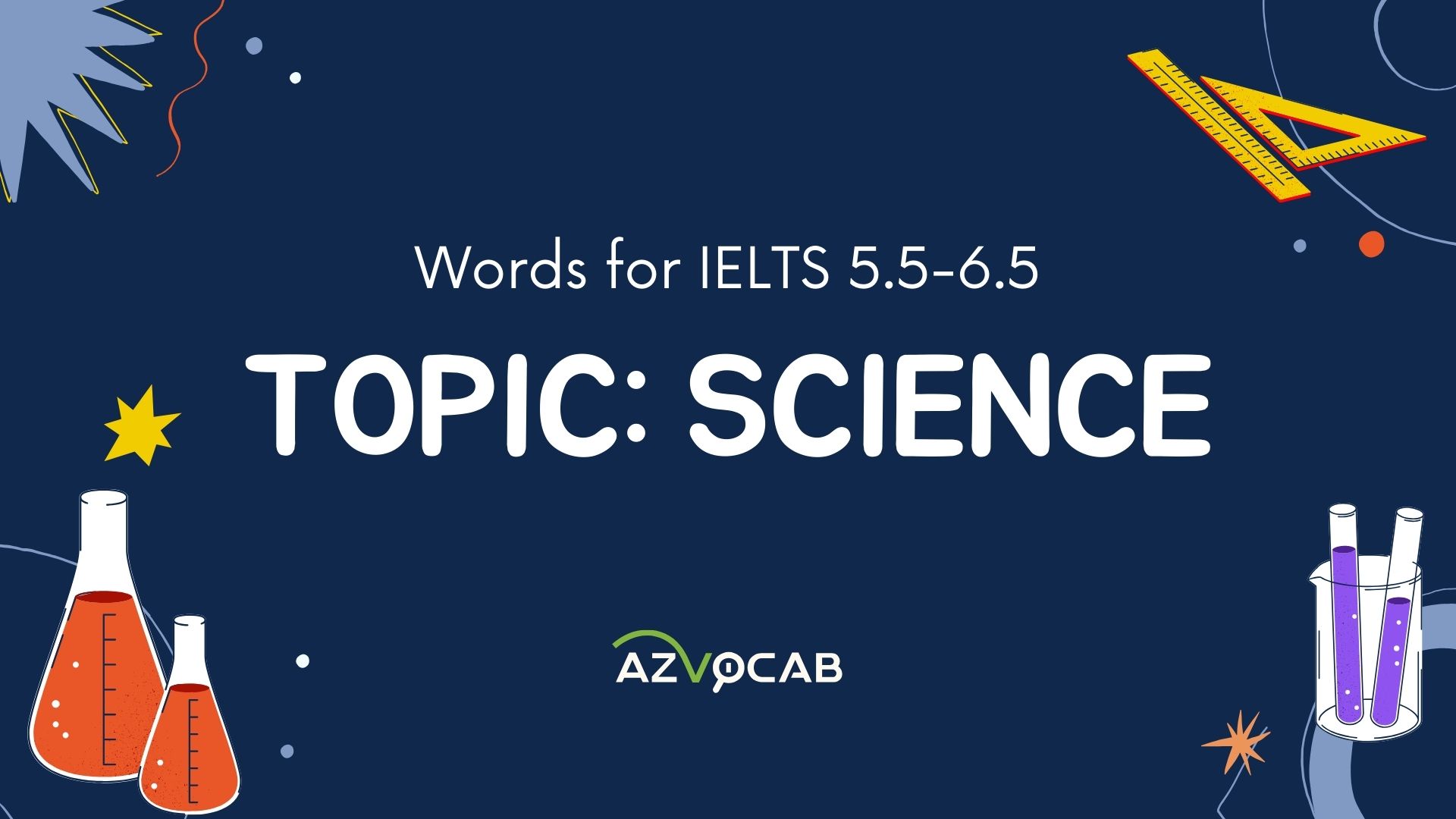50+ Common Words on the Topic of Fame and Media for the IELTS Exam
30 August, 2023Common words for IELTS

azVocab has compiled over 50 common words on the topic of “Fame and Media” for the IELTS exam. These vocabulary words can be used in all four sections of four skills: Reading, Listening, Speaking, and Writing. azVocab has carefully selected examples that fit specific contexts in IELTS exams. This will help you understand how to use these words in context, increasing the effectiveness of your vocabulary learning.
1. Vocabulary related to communication
| broadcaster (n.) – someone whose job is to speak on radio or television programmes | In television markets, for example, commercial broadcasters may be more likely to offer content designed to attract viewers deemed valuable to advertisers. |
| exposé (n.) – a public report of the facts about a situation, especially one that is shocking or has been kept secret | I believe there are many publishers and broadcasters that do still have a strong tradition of exposés and investigative journalism. |
| ideology (n.) – a set of beliefs or principles, especially one on which a political system, party, or organization is based | Fifteen years after the president embraced the ideology of privatization, the people were worse off than ever. |
| relevance (n.) – the degree to which something is related or useful to what is happening or being talked about | The relevance of this novel to the current situation is striking. |
| artificial (adj.) – made by people, often as a copy of something natural | Famous people’s lives seem to be very superficial because they spend all of their time going to parties and trying to look glamorous. It all seems very artificial to me – they just don’t seem to be part of the real world at all. |
| biased (adj.) – showing an unreasonable like or dislike for a person based on personal opinions | Baxter contends that, while the public’s attitude towards women in politics has evolved considerably, media coverage both on TV and in the press, has failed to keep pace and remains biased against them. |
| controversial (adj.) – causing disagreement or discussion | The ocean of digital information about us isn’t limited to likes and dislikes or opinions. Though it’s still controversial, and difficult to get hold of, some teams are accessing much more in the way of personal details. |
| distorted (adj.) – false or wrong | In my view, the inevitable home-town bias of local newspapers could give distorted views in terms of the number and length of particles they contain. |
| mainstream (adj.) – considered normal, and having or using ideas, beliefs, etc. that are accepted by most people | In recent times we have seen evidence of this where paedophiles have been caught using peer-to-peer networks, bypassing mainstream networks to exchange files. |
| prejudiced (adj.) – showing an unreasonable dislike for something or someone | The media has been accused of presenting a prejudiced view of people with disabilities. |
| unbiased (adj.) – able to judge fairly because you are not influenced by your own opinions | Most people believe that this newspaper favours the government too much to provide unbiased coverage of the election. |
| universal (adj.) – existing everywhere or involving everyone | The most successful products in the world are those that have a universal appeal. |
| assert (v.) – to say that something is certainly true | The book begins by examining the stereotypes that the media ascribes to female candidates and asserts that, as well as portraying women as incompetent leaders, reporters also tend to describe them their according to their fashion choice. |
| broadcast (v.) – to send out a programme on television or radio | Our modern society often prides itself on its free press and, with access to the Internet and cable television the news is broadcast 24 hours a day. |
| censor (v.) – to prevent part or the whole of a book, film, work of art, document, or other kind of communication from being seen or made available to the public, because it is considered to be offensive or harmful, or because it contains information that someone wishes to keep secret, often for political reasons | And this would seem to be what tabloid journalism is doing. They are effectively censoring important news stories on the basis that they may not be interesting or entertaining enough. |
| ignore (v.) – to intentionally not listen or give attention to | We need to ignore all of the media hype and examine this problem carefully. |
| influence (v.) – to affect or change how someone or something develops, behaves, or thinks | Some people think we are too influenced by celebrities these days. |
| publicize (v.) – to make information about something generally available | Many companies publicize themselves as ecotourism companies, but not all of them follow ecotourism principles. |
| publish (v.) – to make information available to people, especially in a book, magazine, or newspaper, or to produce and sell a book, magazine, or newspaper | Alcott was still writing novels for girls, including two sequels to Little Women: Little Men and Jo’s Boys. The latter was published in 1886. |
| report (v.) – to give a description of something or information about it to someone | Social scientists have jong had to rely on crude questionnaires or interviews to gather data to test their theories and methods marred by reporting bias and small survey sizes. |
2. Vocabulary related to media
| access (n.) – the right or opportunity to use or look at something | From the very beginning of the Information Age, having immediate access to data was fundamental to progress. |
| censorship (n.) – the action of preventing part or the whole of a book, film, work of art, document, or other kind of communication from being seen or made available to the public, because it is considered to be offensive or harmful, or because it contains information that someone wishes to keep secret, often for political reasons | It would seem that the media today seeks to entertain rather than inform the public. I define censorship as anything which interferes with the free flow of information in our society. |
| conjecture (n.) – a guess about something based on how it seems and not on proof | There’s been a lot of conjecture in the media recently about marriage. |
| exposure (n.) – the fact of something bad that someone has done being made public | The exposure of the politician’s love affair forced him to resign. |
| mass media (n.) – newspapers, television, radio, and the internet | The mass media is very influential in our society and has a big impact on young people. |
| media (n.) – the internet, newspapers, magazines, television, etc., considered as a group | It would seem that the media today seeks to entertain rather than inform the public. |
| network (n.) – a large system consisting of many similar parts that are connected together to allow movement or communication between or along the parts, or between the parts and a control centre | For this project we compiled a list of what we considered to be the most significant current affairs stories and then we assessed how these stories were reported by newspapers and radio and television networks. |
| publication (n.) – a book, magazine, newspaper, or document in which information or stories are published | There is an enormous amount of alternative media that provide a healthy balance to the mainstream. If people want to be informed, they are unlikely to turn to tabloid newspapers to do so. Instead, they can access a wide range of journals, magazines and smaller publications. |
| publisher (n.) – an organization that publishes text or music | Whilst every care has been taken to ensure accuracy, the publishers cannot accept legal responsibility for any problems that arise. |
| safeguard (n.) – a law, rule, or something that is done to protect someone or something from harm or damage | The safeguards in place for traditional media just don’t exist there at the moment. |
| speculation (n.) – the activity of guessing possible answers to a question without having enough information to be certain | There has been a lot of speculation in the media about the identity of the victim. |
| Web/website (n.) – a set of pages of information on the internet about a particular subject, published by a single person or organization | To examine what made one song more successful than others, Watts and Salganik created a project called Music Lab. It featured a website where more than 14,000 people listened to songs by relatively unknown bands, rated them and downloaded them if they wanted. |
3. Vocabulary related to the press
| bias (n.) – the action of supporting or opposing a particular person or thing in an unfair way, because of allowing personal opinions to influence your judgment | Whoever controls the media also has ultimate control over what is published or broadcasted and what is omitted. They can also add a certain prejudice or bias to their coverage of certain news stories depending on their own feelings about the matter. |
| current affairs (n.) – political news about events happening now | The volume of emails ranged from 5 to 25 emails per day depending on current affairs. |
| editor (n.) – a person who corrects or changes pieces of text or films before they are printed or shown, or a person who is in charge of a newspaper or magazine | I was the editor of the student magazine for a while. People sent in all kinds of articles. I had to choose what to include and then put it all together. |
| free press (n.) – if a country has a free press, its newspapers, magazines, and television and radio stations are able to express any opinions they want, even if these criticize the government and other organizations | Our modern society often prides itself on its free press and, with access to the Internet and cable television the news is broadcast 24 hours a day. |
| headline (n.) – a line of words printed in large letters as the title of a story in a newspaper, or the main points of the news that are broadcast on television or radio | Not every success story makes it into the headlines. |
| journal (n.) – a serious magazine or newspaper that is published regularly about a particular subject | One thing that helps me do that is to know what you’re doing in the classroom, so I require all my students to keep a journal about their teaching experience. |
| journalism (n.) – the work of collecting, writing, and publishing news stories and articles in newspapers and magazines or broadcasting them on the radio and television | I define censorship as anything which interferes with the free flow of information in our society. And this would seem to be what tabloid journalism is doing. |
| news (n.) – information or reports about recent events | Nowadays we have access to the news 24 hours a day. |
| newspaper (n.) – a regularly printed document consisting of large sheets of paper that are folded together, or a website, containing news reports, articles, photographs, and advertisements | The study revealed that newspapers avoid reporting on the gap between the rich and the poor. |
| newsstand (n.) – a table or temporary structure used as a small shop for selling newspapers and magazines outside in public places | These paperback novels were sold at newsstands and dry goods stores and succeeded in opening up the publishing market for both writers and readers. |
| opinion (n.) – ý kiến, quan điểm | You can control what is printed but you cannot control the opinions of your readers. |
| press (n.) – a thought or belief about something or someone | This study seems to be rather a harsh attack on the press and I can’t agree with its conclusions. |
| tabloid (n.) – a type of popular newspaper with small pages that has many pictures and short, simple reports | Baxter’s study involved a detailed analysis of national broadsheets and one tabloid from each candidate’s local area. |
| informative (adj.) – providing a lot of useful information | Titles should be brief, but informative, and should indicate the nature of the contents, not their import. |
| intrusive (adj.) – affecting someone in a way that annoys them and makes them feel uncomfortable | Being famous nowadays simply means that you’re in the tabloids a lot and you’re followed by the paparazzi everywhere you go. I’d find that very intrusive. |
| sensationalist (adj.) – presenting information in a way that is shocking or exciting rather than serious, especially in newspapers, on television, etc. | These sensationalist headlines give the impression that the sport is being corrupted on a day-to-day basis. |
| paparazzi (n.) – the photographers who follow famous people everywhere they go in order to take photographs of them for newspapers and magazines | The paparazzi can create really dangerous situations just trying to get a photograph of whoever’s making headlines at the moment. |
| expose (v.) – to make public something bad or dishonest | The newspaper story exposed the actor as a liar. |
| intrude (v.) – to go into a place or situation in which you are not wanted or not expected to be | Paparazzi and the press intrude too much into celebrities’ lives. |
| investigate (v.) – to examine a crime, problem, statement, etc. carefully, especially to discover the truth | Researchers may investigate several possible uses of a new drug. |
4. Vocabulary related to the entertainment & fame
| author (n.) – the writer of a book, article, play, etc. | I’m reading a book about it actually and the author makes some very valid points. |
| celebrity (n.) – someone who is famous, especially in the entertainment business | Some personalities are good role models and use their celebrity status to encourage people to think about important issues, but we often see photos of famous people behaving badly. |
| episode (n.) – a single event or group of related events | This latest episode in the fraud scandal has shocked a lot of people. |
| fame (n.) – the state of being known or recognized by many people because of your achievements, skills, etc. | I want to read about people with real talent who’ve actually earned their fame because they are different from the rest of us. |
| gossip (n.) – conversation or reports about other people’s private lives that might be unkind, disapproving, or not true | But I suppose there’s a lot of demand for gossip about celebrities these days, especially in the tabloid press. |
| privacy (n.) – someone’s right to keep their personal matters and relationships secret | Famous people have no privacy at all in any part of their life. |
| publicity (n.) – the activity of making certain that someone or something attracts a lot of interest or attention from many people, or the attention received as a result of this activity | There has been a great deal of publicity about the new James Bond movie. |
| viewer (n.) – a person who watches something, especially television | Millions of viewers will be glued to their sets for this match. |
| eminent (adj.) – famous, respected, or important | She is an eminent psychologist who has won a number of awards. |
| entertaining (adj.) – funny and enjoyable | As far as books go, I think light reading is very popular. People seem to be reading certain novels that are entertaining but not very deep. |
| fascinating (adj.) – extremely interesting | Yet studying advertisements as historical sources can also be fascinating and revealing. |
| high-profile (adj.) – attracting a lot of attention and interest from the public and newspapers, television, etc. | His high-profile clients include several supermodels. |
| prominent (adj.) – very well known and important | Works by Alex Green, whose paintings depict the beautiful scenery this island is famous for, will be a prominent feature. |
| superficial (adj.) – (of a person) never thinking about things that are serious or important | Their life also seems to be very superficial because they spend all of their time going to parties and trying to look glamorous. |
| world-famous (adj.) – known about by many people from most parts of the world | We have main-line railways and a world-famous radio station. |
| invade (v.) – to enter an area of activity in a forceful and noticeable way | Maria looks set to invade the music scene with her style and image. |
| overshadow (v.) – to cause someone or something to seem less important or less happy | Karen has always felt overshadowed by her famous elder sister. |
With the common words provided here, it is hoped that you will have enough vocabulary to conquer the topic of Fame and Media in the IELTS exam. You can explore more vocabulary for other topics through the category “Common words for IELTS” on azVocab.
ielts
ielts vocabulary
4650
Share





